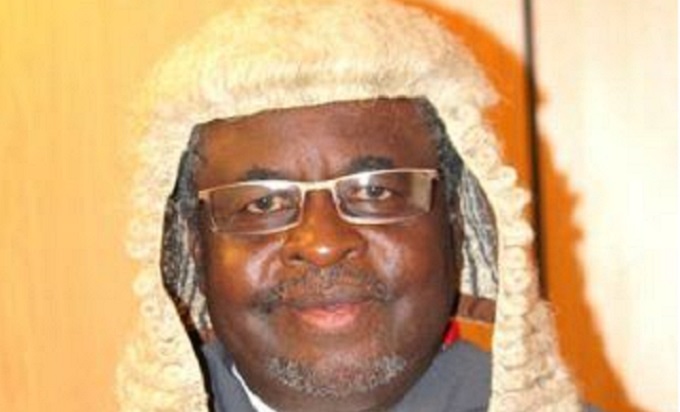Paperwork to repatriate Prof Ndlovu’s body ready today

Oliver Kazunga, Senior Reporter
PAPERWORK to repatriate the body of National Hero and former Cabinet Minister, Professor Callistus Dingiswayo Ndlovu who died in South Africa last Wednesday will be finalised today and the body is expected to arrive home tomorrow.
In a telephone interview yesterday, Zimbabwe’s Consul-General to South Africa, Mr Batiraishe Mukonoweshuro said paperwork will be finalised today.
“The funeral parlour handling the matter is finalising the paperwork tomorrow (today) and the body is expected to leave for Zimbabwe on Tuesday (tomorrow),” he said.
Zanu-PF Bulawayo province spokesman Cde Christopher Sibanda said they expect everything to go according to plan.
At the time of his death, Prof Ndlovu was Zanu-PF Bulawayo provincial chairman.
On Friday, Zanu-PF Secretary for Administration, Dr Obert Mpofu announced at Prof Ndlovu’s house in Kumalo suburb, Bulawayo, that the Politburo had unanimously conferred national hero status on the late liberation fighter.
The family of Prof Ndlovu who succumbed to pancreatic cancer in South Africa, has provisionally agreed that the late National Hero be buried at the Ntional Heroes Acre on Saturday although it is subject to approval by the Government.
Prof Ndlovu was born on February 9, 1936 in Plumtree, where he did his primary and secondary education before joining the National Democratic Party in 1960.
He then trained as a teacher, enrolling for a Bachelor of Arts degree at Pius XII University College in Lesotho where he became involved with Zapu in 1963 as chairman of the party’s residents and students branches.
At the university, Prof Ndlovu was also president of the Student Representative Council (SRC) from 1963 to 1964.
He was also publicity secretary of the National Union of Basutoland Students (NUBS) from 1964 to 1965.
The late National Hero also studied at the University of South Africa, graduating with a Bachelor of Arts Degree in 1965 majoring in History, Economics and Political Science.
Back in Zimbabwe, he taught at Empandeni High School in Mangwe district, Mafakela Government School and Mpopoma High School in Bulawayo.
While teaching at Mpopoma in 1966, Prof Ndlovu was detained by the Rhodesian regime which felt that his influence among African teachers was not good for the regime which accused him of promoting the objectives of Zapu guerrillas.
He was released after 90 days and left the country in 1967 for New York University where he enrolled for his Masters and PhD studies.
During the course of his studies at New York University, Prof Ndlovu became very much involved with Zapu, and became the party’s chairman in North America from 1967 to 1971.
He set up an office near the United Nations.
This was quite an important office for Zapu because the party co-ordinated most of its external relations outside Africa and the office in London, United Kingdom depended on information from his office.
He once lectured at the Hofstra University in Long Islands in New York.
Prof Ndlovu was also granted Freedom of the City of Minneapolis in 1972.
He received a number of honours, which include an award for Distinguished Teaching in America in 1973 and was a Fellow of the Aggrey Fellowship of the Edward Hazen Foundation.
Prof Ndlovu also attended the Geneva talks as a political advisor in the Zapu delegation in 1976 as well as the Lancaster House Talks on Zimbabwe.
For nine years up to 1980 he was a member of the Revolutionary Council and represented the party at the United Nations and North America.
After independence, he worked as a director at Carbin Finance and the Group industrial relations manager at Union Carbide Corporation in the early 80s.
Prof Ndlovu was a Central Committee member from 1980 to 1983 and the Bulawayo provincial chairman of the Zimbabwe African National Union (Zanu) from 1984 to 1987.
He was a Member of Parliament from 1980 to 1985 and a Member of the Senate from 1985 to 1990.
At the same time he was an MP and senator, he was appointed the Minister of Construction between 1982 and 1983 before he was appointed the Minister of Mines from 1983 to 1984.
Between 1984 and 1989 he was the Minister of Industry and Commerce.
In 1990 he was an executive consultant with the Treger Group of Companies and a member of the Joint Private Sector Standing Committee to promote trade between Zimbabwe and Botswana and also worked as the chief executive officer at Calding Consultants (Pvt) Limited in 1991.
In 2000, Prof Ndlovu was a member of the Constitutional Commission of Zimbabwe.
Prof Ndlovu also worked for the Zimbabwe Institute of Public Administration and Management (Zipam) for several years.
He was once chairman of the Board of Directors at NetOne and chairman of the Foundation Task Force of the Gwanda State University.
At the time of his death, Prof Ndlovu was a member of the Zanu-PF Central Committee and Bulawayo provincial chairman.
Prof Ndlovu is survived by wife Angeline, several children and grandchildren.
Mourners are gathered at 3 Fletcher Road, Kumalo in Bulawayo. — @okazunga.












Comments